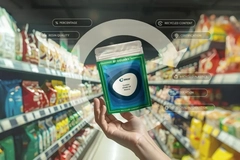Alliance to End Plastic Waste publishes playbook for plastic value chain transition

The Alliance to End Plastic Waste (AEPW) has released its third Solution Model playbook, providing a roadmap to reintroduce mixed plastic waste streams into the value chain using scalable recycling methods. This model is designed to cater to low-income economies and developed nations with mature recycling infrastructure.
The Solution Model playbook, “Capturing Value Through Basic Mechanical Recycling of Mixed Plastic Waste,” outlines how basic mechanical recycling, employing simple technologies, can transform mixed plastic waste into new products like furniture, construction materials and eco-aggregate materials.
Jacob Duer, president and CEO at the AEPW, says: “Tackling plastic pollution requires a multifaceted, multistakeholder approach. Solution Model playbooks are aimed at improving the understanding of the many stakeholders across the plastic value chain about what is possible and what else is needed to drive systems change to end plastic waste in the environment and develop a circular economy for plastics.”

“Our hope is that the playbooks will encourage other organizations to scale and replicate these solutions as we seek a wide range of partners to accelerate the achievement of a circular economy that transforms plastic into a sustainable material.”
Advancing circularity
AEPW’s playbook prioritizes collection along with processing and converting in the recycling value chain. The collection component focuses on ensuring a consistent recycling feedstock supply. Processing and converting employs scalable, low-technology solutions to transform mixed waste streams into products, keeping recovered plastic in circulation.
Several advantages of basic mechanical recycling are emphasized by the playbook, including low capital investment, sustainable product development, job creation and economic growth as well as environmental benefits.
 AEPW developed Solution Models to guide stakeholders in managing plastic waste and promoting recycling.The playbook has been developed in collaboration with the Boston Consulting Group (BCG). It also incorporates insights from projects across various geographies by CRDC Global, Plastic Flamingo and the ASASE Foundation.
AEPW developed Solution Models to guide stakeholders in managing plastic waste and promoting recycling.The playbook has been developed in collaboration with the Boston Consulting Group (BCG). It also incorporates insights from projects across various geographies by CRDC Global, Plastic Flamingo and the ASASE Foundation.
Arun Rajamani, managing director and partner at BCG, says: “Speed, efficiency and scalability are critical to addressing the challenges of plastic waste management, especially in the face of rising global plastic consumption.”
“At BCG, we are committed to advancing sustainability and circularity, which is why, in close collaboration with the AEPW, we applied our expertise to help design, document and disseminate these Solution Models. We hope these playbooks, enriched with practical insights, lessons learned and real-world examples, will empower stakeholders to strengthen recycling systems and accelerate progress toward a circular economy.”
Building sustainable solutions
The playbook builds on earlier Solution Models published in March 2024, which addressed segregated municipal waste collection and basic manual sorting of waste.
The playbook’s solutions target countries at varying stages of waste-management maturity. It also provides insights on using simple technologies to use plastic waste in replacing materials like wood and concrete.
The playbook suggests that leveraging recycled products is instrumental in producing sustainable, cost-effective and durable products. For instance, Plastic Flamingo employs compression molding technology to recycle mixed plastic waste into standardized eco-boards. These eco-boards are said to offer the same versatility and functionality as common alternatives like plywood or chipboard.












